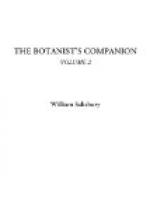“The land where the Beet is grown is of an excellent quality, very deep and fertile, and such as will grow any crop for a series of years without manure. Such soils are seldom found in this country but what may be cultivated to more advantage. In such land, and such alone, will this vegetable imbibe a large quantity of the saccharine fluid; for it would be in vain to look for it in such Beet roots as have been grown on poor land made rich by dint of manure.
“It may also be a circumstance worth remarking, that although the sugar thus obtained is very good for common use, it by no means answers the purpose of the confectioner, as it is not fit for preserving; and for this purpose the cane sugar alone is used; so that although great merit may attach to the industry of a person who in times of scarcity can produce such an useful article as sugar from a vegetable so easily grown, yet when cane sugar can be imported at a moderate rate, it will always supersede the use of the other.”
56. Pyrus malus. The apple.—This useful fruit, now growing so much to decay in this country, which was once so celebrated for its produce, is grown in great perfection in all the northern provinces of France; and she supplied the London markets with apples this season, for which she was paid upwards of 50,000 l.; and can most likely offer us good cyder on moderate terms.
The French people, ever alive to improvement and invention, having discovered a mode of extracting sugar in considerable quantity from this fruit, I shall transcribe the particulars of it.
On the Preparation of Liquid Sugar from Apples or Pears. By M. Dubuc. (Ann. de Chim. vol. lxviii.)—“Several establishments have been made in the South of France for making sugar from grapes; it is therefore desired to communicate the same advantage to the North of France, as apples and pears will produce sugar whose taste is equally agreeable as that of grapes, and equally cheap.
“Eight quarts of the full ripe juice of the Orange Apples was boiled for a quarter of an hour, and forty grammes of powdered chalk added to it, and the boiling continued for ten minutes longer. The liquor was strained twice through flannel, and afterwards reduced by boiling to one half of its former bulk, and the operation finished by a slow heat until a thick pellicle rose on the surface, and a quart of the syrup weighed two pounds. By this method two pounds one ounce of liquid sugar was obtained, very agreeable in flavour, and which sweetened water very well, and even milk, without curdling it.
“Eight quarts of the juice of apples called Doux levesque, yielded by the same process two pounds twelve ounces of liquid sugar.
“Eight quarts of the juice of the sour apples called Blanc mollet, yielded two pounds ten ounces of good sugar.
“Eight quarts of the juice of the watery apples called Girard, yielded two pounds and a half.




